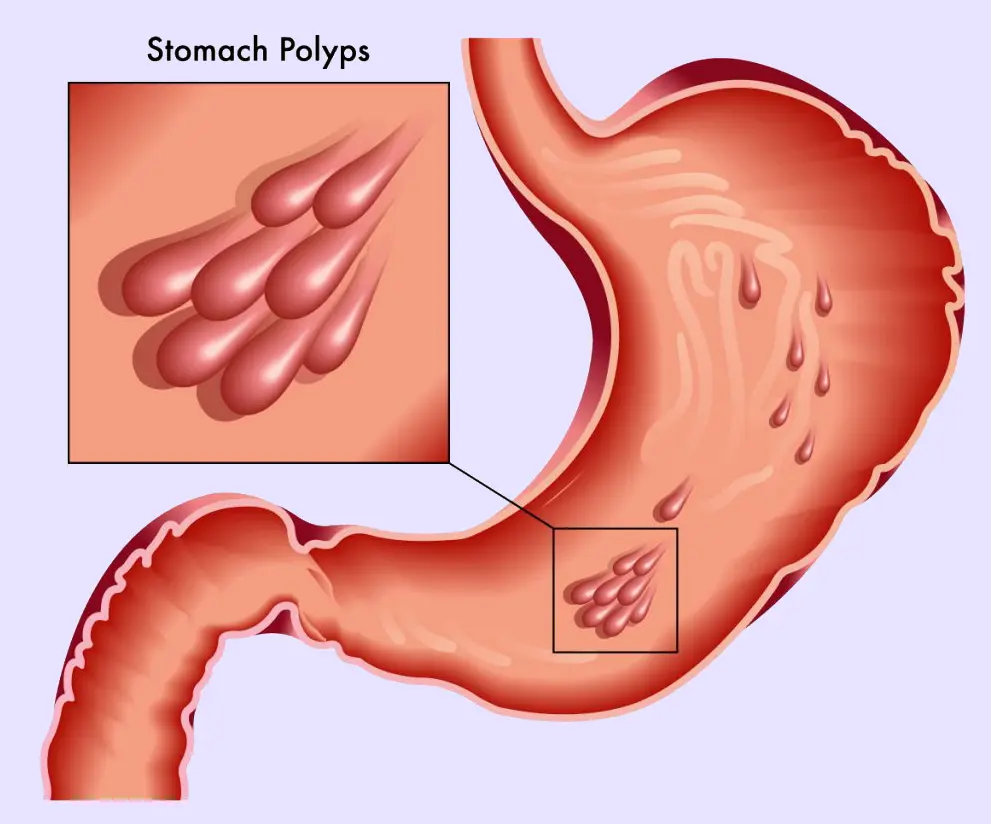Posterior cortical atrophy is a rare, progressive neurodegenerative disorder. In posterior cortical atrophy, you lose neurons (brain cells) in the part of your brain that manages what you see. Early symptoms include vision issues, like having trouble reading, bumping into things or judging distances. As the disease gets worse, you may develop other symptoms, including memory loss. Neurodegenerative diseases like Alzheimer’s …
Porphyria
The term porphyria describes a group of eight disorders that affect the skin and nervous system. Most of these disorders are inherited (passed down from family members). One type of porphyria, porphyria cutanea tarda (PCT), isn’t always inherited. How common is porphyria? Porphyria is rare. Doctors don’t know the exact number of people living with this condition, because many have …
Stomach Polyps
Stomach polyps are small growths that form on the inner lining of the stomach. Most polyps are benign (noncancerous), but some types can increase the risk of developing stomach cancer over time. They are often discovered incidentally during an endoscopy performed for other digestive issues. The size, number, and type of polyp determine whether treatment is necessary. Symptoms Many stomach …
Polymyositis
Polymyositis is a rare autoimmune disease that makes your immune system attack your muscles. It’s a type of myositis. Myositis causes chronic inflammation in your muscles — swelling that comes and goes over a long time. Eventually, this inflammation makes your muscles feel weak. If you have polymyositis, you may have inflammation in multiple muscles at the same time. It usually affects the muscles on or near the center …
Polymyalgia Rheumatica
Polymyalgia rheumatica is an inflammatory condition affecting people over 50 years of age that causes pain and stiffness in your neck, shoulders and hips. It may also affect your upper arms, thighs and back. You’ll usually feel the pain and stiffness on both sides of your body. The aching and stiffness are usually worse in the morning or when you haven’t moved …
Polymorphous Light Eruption
Polymorphous light eruption (PMLE) is a common skin rash that develops after exposure to ultraviolet (UV) light. What does polymorphous light eruption mean? “Polymorphous” means it looks different in different people. “Eruption” refers to the sudden onset of the rash, usually within 30 minutes of UV light exposure. This rash is also known as PMLE, sun allergy or sun poisoning. How common …
Polyhydramnios
Polyhydramnios is when you have too much amniotic fluid during pregnancy. Amniotic fluid is the liquid that surrounds the fetus in your uterus. Amniotic fluid plays a significant role in the fetus’s growth and development. This condition usually happens in the second half of pregnancy, but it may occur as early as 16 weeks into pregnancy. Mild polyhydramnios doesn’t usually cause complications. Your pregnancy …
Polycythemia Vera
Polycythemia vera (PV) is a blood disorder that causes your body to produce too many red blood cells. Too many red blood cells can make your blood thick and sluggish and increase your risk of blood clots and complications such as heart attack and stroke. It can also cause vague but irritating symptoms, such as skin itchiness, ringing in your ears, abdominal pain, nose bleeds and blurred or …
Polio
Polio (poliomyelitis) is a disease caused by poliovirus. It causes mild or no symptoms in most people, but in some people it can cause paralysis or death. There are three variations of poliovirus, called wild poliovirus type 1, 2 and 3 (WPV1, WPV2 and WPV3). Wild polio types 2 and 3 have been eradicated (no longer exist), and wild polio type 1 …
Poison Ivy Rash
Poison ivy is a common poisonous plant that causes an itchy skin rash. Other rash-inducing poisonous plants include poison oak and poison sumac. These plants produce an oily sap that contains urushiol (pronounced yer-OO-shee-all), which causes an irritating, itchy allergic reaction. When you touch the poisonous plant or an object that’s been in contact with the plant’s oil, you develop an …
